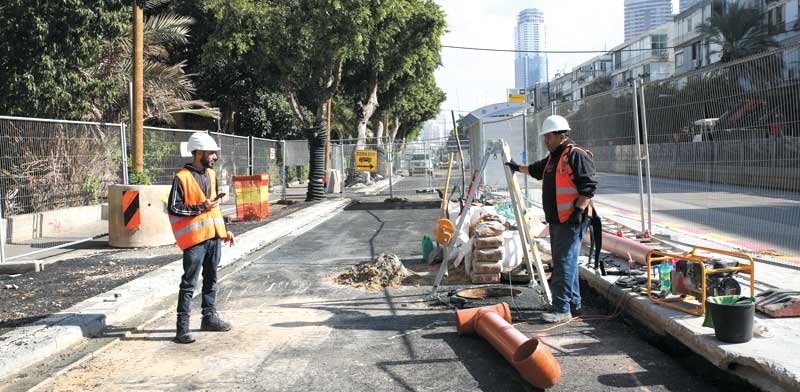Tel Aviv light rail Purple Line seen cutting property values

Construction of an elevated section of the Tel Aviv light rail Purple Line is forecast to reduce the value of homes along the route, according to former chairman of the Real Estate Appraisers Association in Israel Ran Wiernik. The reduction in value will mainly be due to difficulties in access caused to some of the buildings along the route. Wiernik has found. Wiernik examined the situation of 150 apartments along Arlozorov Street, along which the Purple Line will run, on behalf of the committee for the street's residents.
When completed, the Purple Line will link Tel Aviv with Ramat Gan and Givat Shmuel with some elevated sections along the route. Wiernik says, "This fact in itself harms the value of adjacent residential areas because the light rail and its overall installations including the planned stations and platforms will make the level of noise along the street louder. Among other things, nuisances will include loud sirens for passengers, and crowding along the road throughout the day, which is very different than if this was an underground line."
However, the biggest problem will be a physical one because the plan calls for some apartment blocks to have their front yards requisitioned for the project. Moreover, some apartment buildings will have their car parks blocked, rendering them unusable. "The plans documents are not detailed in terms of texts or graphically about such blocking, except for an X marking some of the buildings, with the index of the sketches mentioning that this mark means 'blocking the car park entrance.' So it is unclear whether the plan is talking about just blocking the entrance to the car park or completely blocking access to the building by car.," Wiernik writes.
The value of a personal parking space for an apartment in this region is estimated at about NIS 700,000 while shared parking is worth an estimated NIS 500,000.
Wiernik even mentions the significance for new construction. "Denying access to vehicles negates the ability to build onto the existing buildings (including renovations and adding an elevator) and/or to rebuild with full building rights (TAMA 38/2 for example) because it is impossible to implement building works without access to vehicles." Wiernik estimates that this limitation reduces an apartment's value by NIS 1 million or more. He also writes that there are instances where front yards will be requisitioned, which will also reduce the possibility of implementing projects like TAMA 38 earthquake retrofits, which will result in an additional reduction to the value of apartments.
A comparison of housing prices in Arlozorov Street with prices in Jabotinsky Street to the north found that the market already 'expects' problems being created by the light rail. It was found that while in 2014, prices of apartments in both streets were similar, since then there has been a clear trend of prices rising more quickly in Jabotinsky Street than in Arlozorov Street where prices are rising more moderately. A significant gap in the prices between the two streets has opened up.
Wiernik explains, "The market has understood the trend in advance because people talk about and hear about the problems resulting from the plans long before they are approved.
Wiernik adds that in there months' time the deadline will expire for property owners to file claims for reduction in value according to clause 197 of the Planning and Building Law.
Related News
